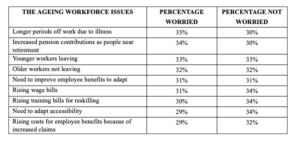Unconscious ageism in the workplace continues to be an issue for employees of all generations, new research from AIG Life has revealed, but employers are addressing an ageing workforce through group benefits.
Nearly one in 10 (9%) of over-50s said they did not tell colleagues they had turned 50 for fear of being considered old.
The nationwide study of more than 3,000 working adults found that 44% of over-50s believe their age will count against them for promotions and pay rises.
Age was also an issue for those under 40, with around 40% admitting to having concerns that older colleagues block their career progression and pay rises, while more than half (55%) worry their own careers will stall once they turn 50.
However, the study showed that businesses were attempting to tackle the issue, with 67% stating that they are adapting to the impact of an ageing workforce, while 17% have expanded employee benefits to cater for older workers.
According to government data, there are a record 10 million people aged over 50 in the workforce and 72.7% of people aged between 50 and 64 years of age are still working.
Lee Lovett, managing director for group protection, AIG Life, described the findings as “sad” and said over-50s remain an integral asset in the workplace.
He said: “Society needs to see every generation of work as integral asset yet there’s clearly still some level of ageism across employees of all ages. It would be interesting to understand where this employee ageism is derived because businesses accept that workforces are ageing and need to be supported – they are adapting and recognising that there are benefits to an older workforce.
“Group benefits that help them manage their financial and physical health and wellbeing can play a major role in helping companies to support employees and retain and recruit staff.”
The findings showed that employers’ greatest concerns around an ageing workforce were increased sickness and pension contributions, while issues such as training and employee benefit costs were not considered major concerns.































